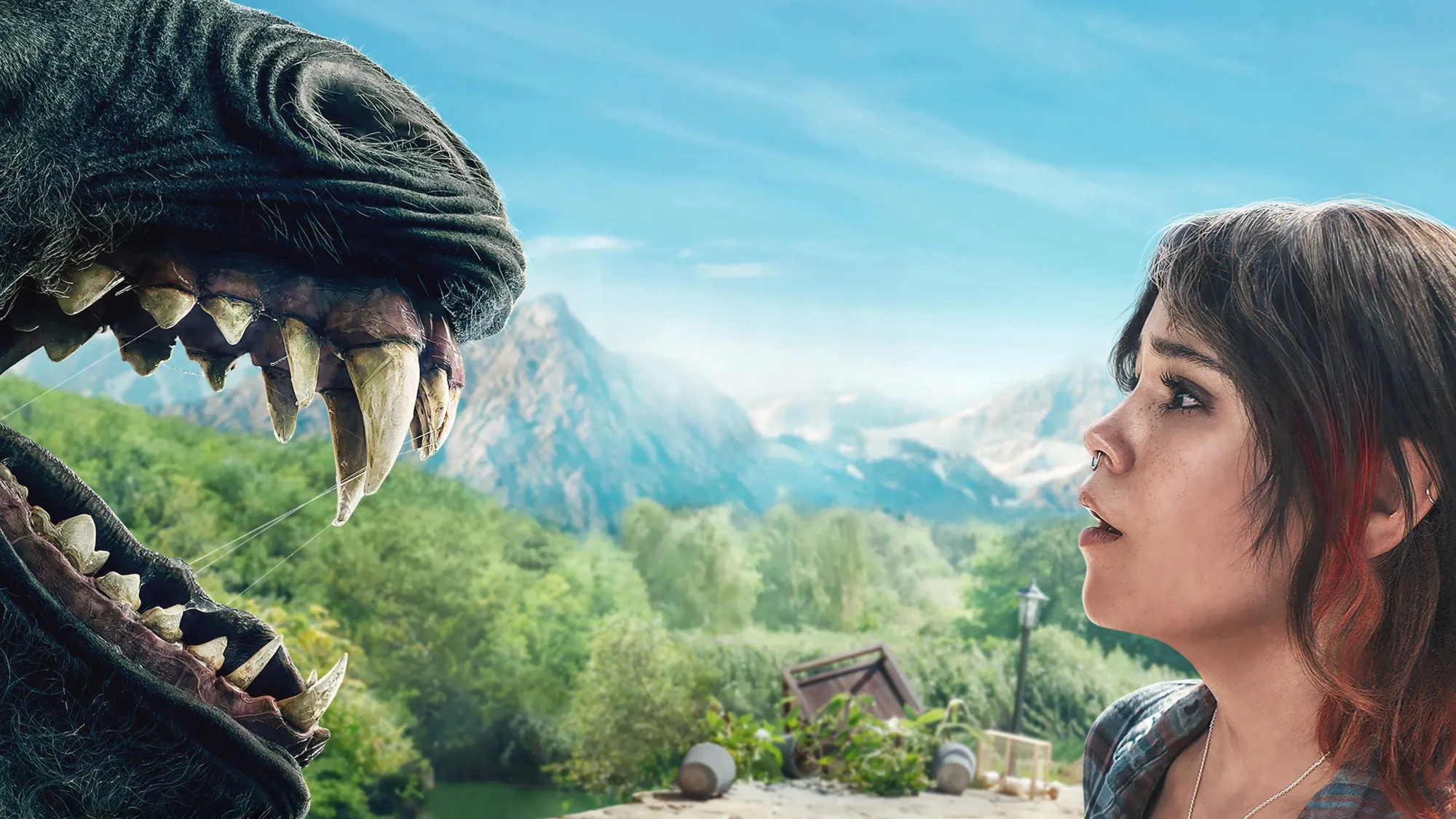Meet the Movie That’s Like The White Lotus on Acid
Ever wished for an eat-the-rich satire with mystical killer unicorns? You’re in luck.
good.film
9 months ago

Share

Have you noticed a whole lot more “Eat the rich” satires on your screens since COVID? If you haven’t heard the phrase, it’s been around since the French Revolution (“When the people shall have nothing more to eat, they will eat the rich”). And in a world where the top 1% now possess more wealth than the bottom 95% of humanity combined, it couldn’t feel more timely. So of course, that pent-up appetite’s being reflected in the stories we tell.
We’re thinking of films like Glass Onion, where a Musk-like tech billionaire hosts an elaborate murder mystery on his private island. The Menu and Triangle of Sadness both skewered the cluelessness of the ultra-wealthy in an exclusive restaurant and on a cruise ship, respectively. And The White Lotus just wrapped another season where once again, unimaginable riches tend to dissolve away morality like whipped cream atop a piña colada.
In every case, excess and access are satirized. Perspectives and self-awareness are warped. And eventually – because ‘drama’ – dead bodies turn up, usually floating face-down in a gorgeous infinity pool (side note: why are the uber-rich so murdery?). But for all their common ground, there’s one thing that NONE of these stories feature, until now. Freakin’ unicorns.
Death of a Unicorn starts off normal enough, with Dad Elliot (Paul Rudd) and daughter Ridley (Jenna Ortega) driving through lush forests to the vast estate of his pharmaceutical company boss. Elliot’s a legal dude – hilariously, his actual title is “VP of Ethics and Compliance”. Those two qualities are exactly what gets tested when out of nowhere, he thumps into a mystery four-legged creature with their Volvo.
In shock, they load it into the boot, but not before Elliot gets splattered with the animal’s blood, and Ridley has a semi-spiritual experience from touching its horn. It’s only after they arrive that Ridley’s teenage acne and Elliot’s hayfever both mysteriously vanish. Suddenly, pharma billionaire Odell Leopold (Richard E. Grant) is deeply interested in the, uhhh, properties of this rather unique forest quadruped. If it can cure those two afflictions, what ELSE can it do?
How does Death of a Unicorn explore grief?
It’s a short drive that opens the film, but we can sense a lot. Elliot’s edgy and distracted by his career. Ridley’s disengaged, and her values don’t seem that aligned with her Dad’s. They clearly aren’t the closest father and daughter. Their conversation adds meat to those bones: they’ve recently lost their wife and Mum, and Elliot’s poured himself into his work instead of being more available for his grieving daughter. It’s partly why they’re on this trip together. But as Ridley drily points out, that’s a one-way desire. I don’t really feel like being a pity prop.
Why introduce a grief theme? Because it takes what could’ve been a single-layered satire and makes Death of a Unicorn run a little deeper. These two characters are navigating very different private journeys, and the unicorn idea is really a metaphor for the unresolved emotions they both need to confront. They’re famously magical animals, and Ridley tells her Dad that when she touched the horn, it’s like she “felt” her Mum. Later, she kinda “dreams in unicorn”, seeing visions of the universe and star-streaked, otherworldly dimensions.
Could it be the afterlife she’s seeing? Or maybe her exposure to the unicorn has “healed” more than just her complexion, somehow opening up a spiritual connection to a loved one that she thought was gone. These surreal elements are a nod to how grief can distort our realities – don’t we all feel like we’re floating in space after a loss? What we love here is the idea that there’s so much healing available in nature, but we’re too busy scrolling or working to connect with it.
There’s an interesting kind of redemption for Elliot later in the film, too. Keep an ear out for when he opens up to Ridley about her Mum’s death, including a promise that he made to her before she died. It goes a long way towards explaining his careerism, reframing it less about greed (ie. his earning potential), and more about providing for Ridley’s security and future. In other words, he was focused on being a protective Dad, but lost sight of being a present one.
What does Death of a Unicorn have to say about corporate greed and exploitation?
As Jurassic Park-era Jeff Goldblum might say, “Well, there it is.” The film’s central theme is an excoriation of good old corporate greed and entitlement, embodied here by Odell Leopold, his wife Belinda (Téa Leoni) and their magnificently coiffed bro-dude son Shepard (Will Poulter). They look at all times like they’re moments away from stepping onto a yacht. Although not ‘stepping’ in Odell’s case: he’s wheelchair bound, fighting cancer and already making plans to be cryogenically frozen in an underground bunker (and before you ask, yes, wealthy elites are really doing this).
As soon as Odell gets a sniff that a miracle cure might be pumping through the local wildlife, the film plays with plenty of layers. There’s the notion of high wealth creating instant privilege: could “unicorn extract” rid Odell of his cancer? A snap of his fingers and there’s a pop-up lab in his home and scientists running tests, despite the animal’s obvious distress. Later, Shepard offers himself as a guinea pig, shouting "For science!" as he snorts a line of ground-up unicorn horn like cocaine. When you’re rich and bored, you’ll jump at any chance for a new thrill.
Then there’s the idea of prioritising corporate wealth over ethics; real-world examples of this include the Sackler family and the opioid crisis. The Leopolds are no better. Belinda is instantly keen to commodify the unicorn’s health properties and trillionize her worth. Imagine what a cancer cure would do for their stock price – as Shepard giddily points out, "Are you kidding me? Cancer?? That's the biggest one!!" Naturally, they hide their profiteering hunger under a mask of do-gooderism. “We have a moral imperative to harness every last one,” Odell announces. “We do this not for our own betterment, but for the betterment of the world!”
As a Gen Z, Ridley feels the opposite. “We can't go out there and strip mine these creatures!” She’s a smart kid. We’ve already heard her refer to the company’s “predatory pricing”; on the drive up, she casually reminds Elliot “You know that philanthropy is just reputational rehab for the oligarchy.” Morally, she’s completely at loggerheads not only with the hosts, but also her Dad, because he’s hemmed into towing the line as their employee. In the yawning gulf between father and daughter, this difference just drives in another wedge.
Ridley’s not shy about voicing her opposition, but what power does she have? Belinda’s so morally empty, she confuses it for an act: “I know you’re standing up for your principles, but we don't need to perform for each other.” It’s obvious they’re going to do whatever they like, and Ridley storms out – as the family pop bottles of champagne that are probably worth more than your car. Then Odell puts on a safari suit to go and hunt more unicorns. Just like the lions, elephants and God knows what else his fortune has given him easy access to.
How does Death of a Unicorn address ideas of family and priorities?
Like we touched on, there’s an ongoing tension between Elliot’s (increasingly strained) loyalty to the Leopolds, and his relationship with Ridley. He clearly loves her, but there's a number of instances where he’s simply not available to his grieving daughter. In one scene, Ridley turns to old photos of her Mum on her phone for comfort, instead of her flesh-and-blood father in the next room. And when Ridley goes digging for some historical accounts of unicorns to try and figure things out, Elliot supports his employers instead of her, which shatters her trust.
That’s affecting because the film makes the point that this loyalty isn’t reciprocal. Odell even bellows Loyalty! Dedication! Commitment! as some kind of remonstrative war cry to cement Elliot to their cause. But really, he’s ruling by fear and threats. It’s always interesting to hear business leaders and billionaires use these kinds of terms to guilt their employees into working harder or longer. The feeling is hardly mutual. Shepard even admits as much to Elliot when things go off the rails: "My Dad only brought you on to be the last line of plausible deniability!!"
Ridley feels the loss of her Mum even more keenly because it’s broken their family from a trio to a pair. She knows that her Mum would’ve said HARD PASS to a unicorn hunt – but without her, Ridley is outvoted. Oh, and there’s a third family in this story: the parents of the captured unicorn, who turn up to reclaim their beloved offspring, and AREN’T HAPPY about the suffering it’s endured at the Leopold’s hands. Like the rhino hunter who gets trampled to death in the quest for his next macabre trophy, there’s a certain satisfaction in watching what comes next.
So - what’s the takeaway from Death of a Unicorn?
This one’s a first-time feature directorial effort from American filmmaker Alex Scharfman, and sure, there’s some rough edges to this magical realism-horror-comedy. But while it’s an odd bird, it’s strange in a compelling way. At first glance it’s another ‘eat the rich’ satire – but look deeper, and it’s a significantly original one. Among a tsunami of studio movies driven by pre-existing IP and toy sales, that’s getting harder and harder to find.
There’s some chunky stuff in here; acceptance of loss and mortality perhaps being the most complex. No spoilers, but watching some major characters die (or do they?), we’re essentially challenged to reflect on our own ideas of the inevitable. And the unicorn is a perfect symbol of innocence to jut up against our habit of human greed. Trust humankind to stumble onto something truly magical and immediately try to harness it and GAIN from it.
Scharfman also resists the pressure to explain these horny beasts. Are these unicorns real? Are they mere illusions? Maybe they’re from space? The repeated visuals of glowing aurora in the night sky, and the impossible swirling galaxies in the creatures’ eyes, seem to link that last idea together. But a concrete answer doesn’t matter. Really what it’s hinting at is that wonder does still exist in the world, and maybe we should stop and appreciate that more, instead of sawing bits of it off and trying to sell or snort them.
Shoutout to the Hungarian crew, who’ve stretched Death’s (relatively tiny) $15 million budget to big effect on the big screen. The sets and scenery look ace, even if the mostly-CGI unicorns aren’t always a winner. But with strong fantasy writing, self-aware performances and its sharp social commentary, Death of a Unicorn gets across the line into our recommendations. It may not win any Oscars, but it’s a film that entertains first, then leaves you with that ‘Huh, clever!’ thinking music on the drive home. Or gallop home, depending on your ride.

